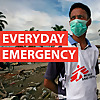
Everyday Emergency
496 FOLLOWERS
Welcome to Everyday Emergency, bringing you true stories from people on the frontline of humanitarian emergencies across the world. Everyday Emergency is the official Medecins Sans Frontieres/Doctors Without Borders (MSF) podcast.
Everyday Emergency
2M ago
MSF's exploratory mission teams complete their reports on their Masisi and Shabunda visits. Details of mass graves, massacres, and the fact that the ADFL used humanitarian teams as bait to lure refugees out of the forests, sent shock waves through MSF offices. A debate about the use of the information collected ensued: should it be made public or not ..read more
Everyday Emergency
1y ago
While the Russian Federation President, Boris Yeltsin talks publicly about a peace plan, his forces carry out a ruthless bombing campaign on rebel-held villages in southern Chechnya. MSF sections are united in wanting to speak out about what their staff witnessed before being forced out of the region, but there’s vigorous debate on how best to draw attention to the atrocities. What is the best way to bring the world’s attention to the plight of the Chechen population? MSF national staff are still working on the ground in southern Chechnya, so will speaking out put their lives in even more dang ..read more
Everyday Emergency
1y ago
The situation in the North Caucasus is getting more and more violent as the Russian federal authorities is trying to forcibly repatriate Chechen refugees and force humanitarian organisations out of Ingushetia. When colleagues at other organisations are kidnapped in Chechnya, MSF closes down all operations in the country again. With a diminishing international presence in the warzone, MSF is once again faced with dilemmas - should it continue to speak out about human rights abuses its staff haven't witnessed? How can they help those in need in the region? And how long will it be before one of t ..read more
Everyday Emergency
1y ago
Kidnappings are becoming more commonplace in Chechnya and closer to home for MSF as various staff members are held for questioning. Then, a key member of the team in the North Caucasus is taken hostage and questions are asked as to whether there's a causal link between MSF’s decision to speak out in the media and the kidnapping? Other difficult questions are raised: should the organisation speak out in the media to create visibility and hopefully bring their colleague some much-needed protection? Or should MSF be as discreet as possible to avoid a rise in the hostage’s so-called ‘market value ..read more
Everyday Emergency
1y ago
MSF’s operations in Chechnya are slowly starting back up again after 3 years of being run remotely. Although the bombing stops, general insecurity is pervasive and restarting these programmes is not without risks. With an international team back on the ground in Chechnya, everyone agrees on the need to document the situation more thoroughly. A collection of patients’ accounts in the report “Chechnya: The politics of terror” is handed over at a press conference. The various MSF sections agree on a coordinated media strategy for getting news out of Chechnya and into the press, in particular the ..read more
Everyday Emergency
1y ago
Throughout the year 2000, MSF seizes every opportunity to raise the alarm on the Chechen’s fate with governments and institutions around the world, but to little concrete effect other than general condemnation. With still no international staff in the country, MSF sections resort to so-called ‘remote control’ management, using locally hired employees to deliver aid on the ground. Concerns over the organisation’s legitimacy in speaking out remain and soon one of the sections starts making unauthorised and dangerous trips over the border into Chechnya from Dagestan where they ran distributions o ..read more
Everyday Emergency
1y ago
With hostilities in Chechnya flaring up again in what the Russian Federation terms as “anti-terrorist operations”, MSF leaders decide to use the ceremony of the reception of Nobel Peace Prize to call on the international community to intervene. But MSF teams are struggling to work in a Chechnya facing all-out war and dangerous security problems. Instead, MSF starts support refugees in the neighbouring republics where they collect first-hands accounts. Inside Chechnya, operations are run through staff members from the Caucasus who are trained, supported, and managed from afar by international t ..read more
Everyday Emergency
1y ago
The first war of independence of Chechnya with the Russian Federation starts in 1994 and runs for two years. In 1999, while the country and its people are still struggling to recover, the Russian authorities start bombing Chechnya again. Through these tough years in the North Caucasus and when access is repeatedly blocked by the Russian forces, MSF staff continues to try to provide food and medical aid to people inside Chechnya and to Chechen refugees in the surrounding republics. From the start of the first war, MSF feeds the press with information on the rapidly deteriorating conditions and ..read more
Everyday Emergency
1y ago
Warning: This episode contains testimony related to child deaths that some listeners may find distressing. A new report by MSF lays bare the cruelty of the long-term detainment of more than 50,000 people, the majority of whom are children, in Al-Hol, northeast Syria. The camp was once designed to provide safe, temporary accommodation and humanitarian services to civilians displaced by the conflict in Syria and Iraq. But the nature and purpose of the camp has long deviated and grown increasingly into an unsafe and unsanitary open-air prison after people were moved there from Islamic State group ..read more
Everyday Emergency
1y ago
In May 1997, MSF published a new study describing the movements of refugees in the Great Lakes region of Africa and the fate of refugees. MSF planned to distribute the report to a small group of journalists, asking them not to cite MSF as the source of the information. However, a lack of communication between MSF offices and with the teams in the field, exacerbates tensions ..read more